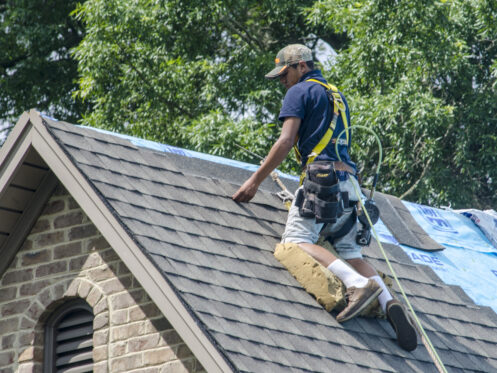As the leaves turn crisp and the cool winds begin to blow, the South transitions to winter preparation. Although we don’t get the bitter cold of Northern winters, we see our fair share of below-freezing nights. As you prepare for winter’s chill, now is a perfect time to consider indoor comfort and the role your roof plays. Roof insulation can keep your home warmer during the winter and reduce your heating costs. Fraser Roofing, LLC in Metro Atlanta provides roof insulation installation for our customers throughout Georgia and South Carolina.
Understanding Roof Insulation
Roof insulation provides a thermal envelope that shields the interior of your home from cold air seeping in through the roof. It acts as a barrier against heat transfer, reducing the movement of cold air from your attic into your living spaces.
There are multiple options for roof insulation, including traditional fiberglass. Professional roof insulation installation ensures adequate protection and better comfort. Roof insulation is an investment that begins to pay off right away.
Why Fall Is the Perfect Time
Fall is the ideal time to install roof insulation because of the mild temperatures. During the summer, attic temperatures can soar to 150°F or more, depending on outside temperatures. Installation in the fall is much more comfortable and easier.
Installing roof insulation in the fall also allows you to get a head start on preparing your home for winter. You can have the insulation in place before your electricity bills begin to spike during the cold snaps. With rising electricity rates across the South, anything you can do to your home to cut costs adds up.
Addressing your roof and attic now can prevent cold-weather surprises later. Checking this item off your home maintenance list will be one less thing to cause you stress.
Energy Efficiency and Lower Utility Bills
According to the US Department of Energy, homeowners can save up to 45% on their annual heating costs with roof insulation. Using the right kind of insulation materials can make a big difference in how warm your home feels during the winter.
Heat loss through your attic and roof occurs when you lack insulation on the underside of your roof. Heat naturally moves from warm to cool areas. Without proper insulation, the heat from your living areas can easily rise into the attic. The Department of Energy states you can lose up to 25% of the heat in your home through an uninsulated roof. This means substantial strain on your furnace and higher energy costs.
Although we think of roof insulation as most valuable during the colder months, it is beneficial throughout the year. It leads to cooler temperatures in the summer by preventing heat transfer. It also helps your air conditioner work more efficiently.
Improved Comfort and Indoor Air Quality
When homes have hot or cold spots, the indoor environment becomes uncomfortable. Many homeowners blame their HVAC systems. While they certainly play a role, a lack of proper roof insulation can also cause these issues. Roof insulation can help balance the temperature throughout your home and eliminate those uncomfortable drafts that arise from transfers from the attic.
Many homeowners are surprised to learn that roof insulation can improve their indoor air quality. It reduces the infiltration of outdoor pollutants like pollen and dust. It also helps regulate moisture to prevent mold and mildew growth that can impact your indoor air quality.
Reducing allergens and moisture problems can help your family breathe easier. You may notice your family’s allergy symptoms decrease, and those with asthma may have fewer attacks, especially when combined with an air purification system.
Roof and Home Protection
Your home needs a sturdy roof and proper insulation to prevent damage that can occur because of moisture problems. Although the South rarely gets blizzards and long periods of below-freezing temperatures, homes can still experience ice dams.
Ice dams occur when snow melts on your roof and then refreezes when temperatures drop, usually at night. The refrozen snow creates a dam that prevents melting snow from draining from your roof. Fluctuating temperatures during the winter can lead to ice dam formation, and your roof and home may suffer damage. You could experience water damage to your roof, interior walls, and ceilings.
Roof insulation also protects your roof and ensures its longevity. It reduces structural stress by preventing condensation damage and that caused by the freeze/thaw cycle. It helps protect your roof against hidden damage, such as rotting and warped wood. Installing insulation now can offer long-term protective benefits.
Types of Roof Insulation for Fall Projects
Fraser Roofing, LLC can help you determine which roof insulation will best fit your home and offer protection. We will assess your home and work within your budget to ensure proper insulation.
Fiberglass Batts
One of the most common roof insulation types seen in Metro Atlanta is fiberglass batts. They are affordable and widely available. However, they can be prone to moisture absorption without proper sealing.
Cellulose
Manufacturers make cellulose insulation from recycled paper treated with fire-retardant agents. It offers good resistance to airflow and provides some degree of soundproofing. The main drawback of cellulose insulation is that it can settle over time, becoming impacted and offering less protection.
Spray Foam
We apply spray foam as a liquid that expands and hardens into a foam. It offers superior insulation properties over fiberglass and cellulose and is resistant to moisture and mold growth. Spray foam roof insulation requires a higher upfront investment than other options.
Rigid Foam
Rigid foam insulation comes in various materials, including polystyrene, polyurethane, and polyisocyanurate. This insulation type provides excellent thermal resistance, and it’s affordable. Rigid foam applications also work well in a variety of areas. Like spray foam, rigid foam can be more expensive than other insulation applications.
You’ll need to consider factors like your home design, climate, and budget. Spray foam insulation is a popular choice for Southern homes. It works well in high-humidity climates because it does not absorb moisture and is not prone to mold and mildew growth. Our experts at Fraser Roofing, LLC can offer guidance to help you select the best insulation type for your home.
Signs Your Roof Needs Better Insulation
Roof insulation can last 20 years or more, depending on the type and installation. It’s a good idea to have your insulation inspected when you have your roof replaced. There are signs you may notice if your roof insulation is not up to par.
- Noticeably fluctuating indoor temperatures
- Higher than usual energy bills
- Uncomfortable drafts
- Pest infestations
- Ice dam formation
- Uneven snow melt
If you notice these signs, we recommend scheduling an attic and roof inspection. Replacing your outdated and worn insulation can dramatically improve your comfort and utility costs.
Trust Us for Your Roof Insulation Needs
The mild weather in autumn is the perfect time to think about roof insulation. You already have your chore list ready, which includes cleaning the gutters and prepping your yard for winter. Adding new insulation to your roof ensures your home stays protected against uncomfortable temperature fluctuations and water damage. It can also impact your family’s health.
Roof insulation adds value to your home. It can last for decades with proper installation and care, ensuring your home and roof remain protected through every season. We will handle every detail to make the process easy.
Fraser Roofing, LLC is your trusted roofing company in Metro Atlanta. We have close to two decades of experience in the roofing industry and bring our knowledge and expertise to every project. We use the best materials and stand behind our work 100%.
Don’t wait for the winter chill to think about your roof. Contact Fraser Roofing, LLC today to schedule your roof inspection.

